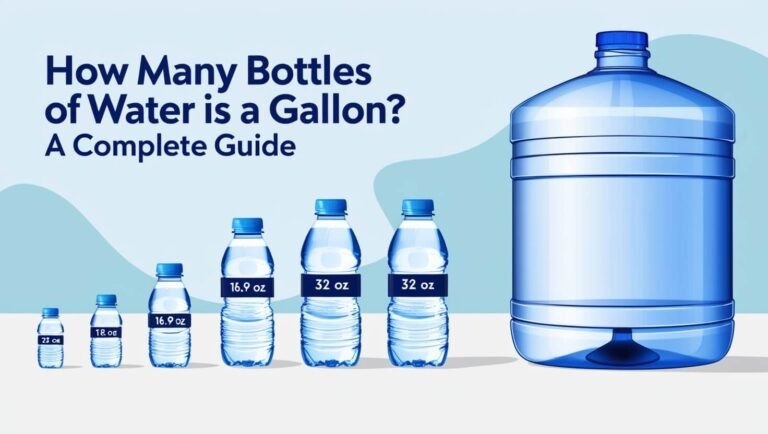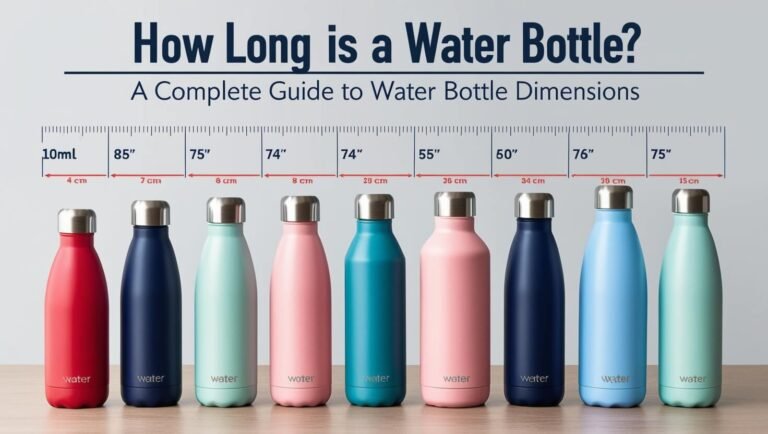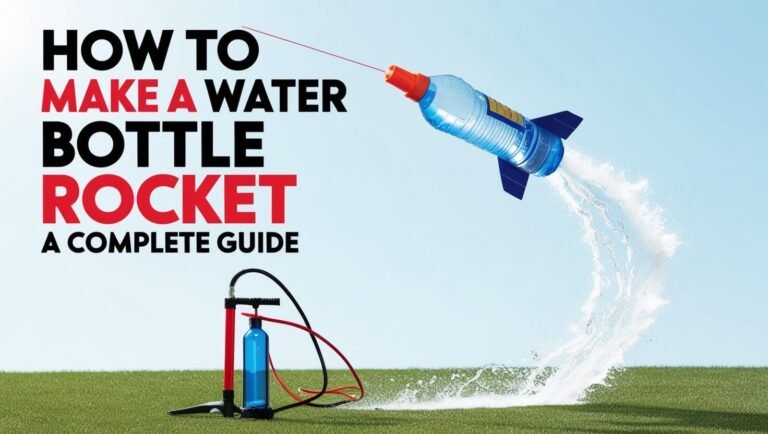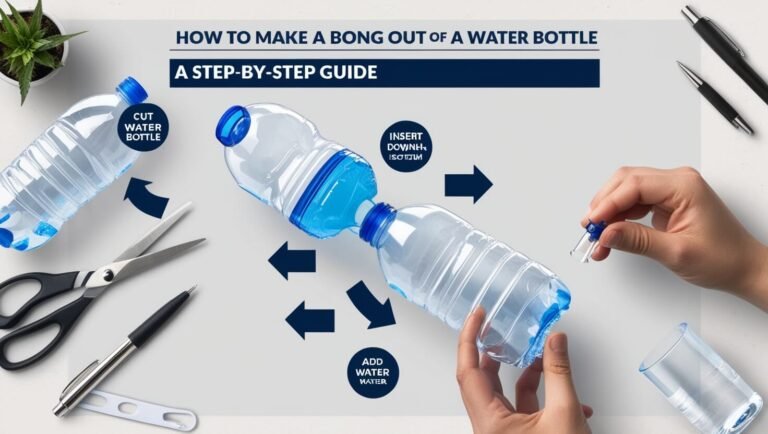How Many Bottle Of Water Should I Drink A Day: A Complete Guide

Staying hydrated is crucial for your health, but figuring out exactly how many bottles of water you should drink each day can be confusing. The short answer is that most adults should aim for 5-7 bottles (16.9 oz each) of water per day. However, your specific needs may vary based on factors like your body size, activity level, and climate. In this comprehensive guide, we’ll break down everything you need to know about daily water intake to keep your body functioning at its best.
The Importance of Staying Hydrated
Water is essential for life. It makes up about 60% of your body weight and plays a vital role in nearly every bodily function. Let’s explore why staying hydrated is so crucial for your health.
Benefits of Proper Hydration
Drinking enough water each day offers numerous health benefits:
- Regulates body temperature
- Aids digestion and prevents constipation
- Cushions joints and protects organs
- Helps transport nutrients and oxygen to cells
- Boosts cognitive function and mood
- Supports healthy skin
- Aids in weight management
- Enhances physical performance
Risks of Dehydration
Not drinking enough water can lead to dehydration, which can have serious consequences:
- Fatigue and dizziness
- Headaches
- Dry skin and lips
- Decreased urination
- Dark-colored urine
- Rapid heartbeat
- In severe cases, heat exhaustion or heat stroke
Recommended Daily Water Intake
While individual needs vary, there are some general guidelines for daily water consumption.
General Guidelines for Water Consumption
The U.S. National Academies of Sciences, Engineering, and Medicine recommends:
- About 15.5 cups (3.7 liters) of fluids per day for men
- About 11.5 cups (2.7 liters) of fluids per day for women
These recommendations include fluids from water, other beverages, and food. About 20% of daily fluid intake typically comes from food, with the rest from drinks.
Factors Affecting Your Water Needs
Several factors can influence how many bottles of water you should drink daily:
- Exercise: You need extra water to replace fluids lost through sweat.
- Environment: Hot or humid weather can make you sweat more, requiring increased fluid intake.
- Overall health: Illnesses, such as fever, vomiting, or diarrhea, can cause fluid loss.
- Pregnancy or breastfeeding: Women who are pregnant or breastfeeding need additional fluids.
- Diet: If you consume a lot of salty, spicy, or sugary foods, you might need more water.
Water Intake Recommendations by Age and Gender
While the general guidelines are a good starting point, water needs can vary by age and gender:
- Children (4-8 years): 5 cups per day
- Children (9-13 years): 7-8 cups per day
- Teenagers: 8-11 cups per day
- Adult men: 13 cups per day
- Adult women: 9 cups per day
- Pregnant women: 10 cups per day
- Breastfeeding women: 13 cups per day
Calculating Your Personal Water Needs
To determine how many bottles of water you should drink daily, consider these personalized methods.
Body Weight Method
A simple way to estimate your water needs is to use your body weight:
- Take your weight in pounds
- Multiply it by 2/3 (or 0.67)
- The result is how many ounces of water you should drink daily
For example, if you weigh 150 pounds: 150 x 0.67 = 100.5 ounces (about 3 liters) per day
Activity Level Adjustments
If you’re physically active, you’ll need to increase your water intake:
- Add 12 ounces of water for every 30 minutes of exercise
- For intense workouts or hot weather, you may need to add more
Climate and Environmental Factors
Living in a hot, humid, or high-altitude environment increases your water needs:
- Hot climate: Increase intake by 1-2 cups
- Humid climate: Increase by 1-2 cups
- High altitude (above 8,200 feet): Increase by 3-4 cups
How to Measure Water Intake in Bottles
Now that you know how much water you need, let’s translate that into bottles.
Standard Water Bottle Sizes
Common water bottle sizes include:
- 8 ounces (237 ml)
- 16.9 ounces (500 ml)
- 20 ounces (591 ml)
- 1 liter (33.8 ounces)
Converting Ounces to Bottles
To figure out how many bottles you should drink:
- Determine your daily water need in ounces
- Divide that by the size of your water bottle
For example, if you need 100 ounces per day and use a 16.9-ounce bottle: 100 ÷ 16.9 = 5.9 bottles per day
Signs You’re Drinking Enough Water
It’s important to listen to your body and look for signs of proper hydration.
Urine Color as an Indicator
One of the easiest ways to check your hydration status is by looking at your urine:
- Pale yellow or clear: Well-hydrated
- Dark yellow or amber: You need more water
- Brown or cola-colored: Severely dehydrated (seek medical attention)
Other Physical Signs of Proper Hydration
Additional signs you’re drinking enough water include:
- Regular urination (4-10 times per day)
- Moist lips and mouth
- Elastic skin (bounces back quickly when pinched)
- Clear, focused thinking
- Steady energy levels
Tips for Increasing Your Daily Water Intake
If you’re struggling to drink enough water, try these strategies to boost your intake.
Setting Reminders and Goals
- Set hourly reminders on your phone
- Use a marked water bottle with time goals
- Drink a glass of water with each meal
- Have a glass of water before and after each bathroom break
Flavoring Your Water
Make water more appealing by adding natural flavors:
- Lemon or lime slices
- Cucumber and mint
- Berries (strawberries, raspberries, or blueberries)
- Herbs like basil or rosemary
Using Apps to Track Water Consumption
Several smartphone apps can help you track your water intake:
- WaterMinder
- Hydro Coach
- Plant Nanny
- Aqualert
These apps send reminders, track your progress, and some even gamify the hydration process.
Common Myths About Water Intake
Let’s debunk some common misconceptions about how many bottles of water you should drink daily.
The 8×8 Rule: Fact or Fiction?
The popular advice to drink eight 8-ounce glasses of water a day (64 ounces total) is not based on scientific evidence. While it’s a good starting point, many people need more or less depending on various factors.
Can You Drink Too Much Water?
Yes, it is possible to drink too much water, although it’s rare. Overhydration, or water intoxication, can occur when you drink more water than your kidneys can process. This can lead to a dangerous condition called hyponatremia, where sodium levels in your blood become diluted.
Symptoms of overhydration include:
- Nausea and vomiting
- Headache
- Confusion
- Seizures (in severe cases)
Most healthy adults are unlikely to experience water intoxication as long as they listen to their body’s thirst cues.
Water Sources Beyond the Bottle
Remember, you don’t have to get all your fluid intake from plain water bottles.
Hydrating Foods
Many foods contain significant amounts of water:
- Cucumbers (96% water)
- Tomatoes (94% water)
- Watermelon (92% water)
- Strawberries (91% water)
- Cantaloupe (90% water)
- Peaches (88% water)
- Oranges (87% water)
Including these foods in your diet can contribute to your daily fluid intake.
Other Beverages That Count Towards Water Intake
While water is the best choice for hydration, other beverages can contribute to your daily fluid intake:
- Herbal tea
- Low-fat milk
- Fruit-infused water
- Coconut water
- Clear broths or soups
Be cautious with caffeinated and alcoholic beverages, as they can have a mild diuretic effect.
Special Considerations for Water Intake
Some groups may need to pay extra attention to their water intake.
Pregnancy and Breastfeeding
Pregnant women need additional fluids to support fetal circulation, amniotic fluid, and increased blood volume. The Institute of Medicine recommends that pregnant women drink about 10 cups (2.3 liters) of fluids daily.
Breastfeeding mothers need even more, about 13 cups (3 liters) of fluids per day, to support milk production.
Athletes and Active Individuals
If you’re very physically active or an athlete, your water needs increase significantly:
- Drink 17-20 ounces of water 2-3 hours before exercise
- Drink 8 ounces of water 20-30 minutes before exercise
- Drink 7-10 ounces of water every 10-20 minutes during exercise
- Drink 8 ounces of water within 30 minutes after exercise
For intense workouts lasting more than an hour, consider sports drinks to replace electrolytes.
Older Adults
As we age, our sense of thirst diminishes, putting older adults at higher risk of dehydration. Seniors should:
- Keep water easily accessible
- Drink water with each meal and snack
- Choose water-rich foods
- Avoid excessive alcohol consumption
The Environmental Impact of Bottled Water
While staying hydrated is crucial, it’s also important to consider the environmental impact of single-use plastic water bottles.
Sustainable Alternatives to Single-Use Plastic Bottles
To reduce plastic waste, consider these alternatives:
- Use a reusable water bottle
- Install a water filter at home
- Use a water cooler or dispenser
- Drink tap water (if safe in your area)
Reusable Water Bottle Options
When choosing a reusable water bottle, consider these materials:
- Stainless steel: Durable and doesn’t retain flavors
- Glass: Easy to clean and doesn’t affect taste
- BPA-free plastic: Lightweight and affordable
- Copper: Believed to have antimicrobial properties
Frequently Asked Questions About Daily Water Intake
Let’s address some common questions about how many bottles of water you should drink each day.
Does Coffee Count as Water Intake?
While caffeinated beverages like coffee can contribute to your daily fluid intake, they also have a mild diuretic effect. It’s best to balance coffee consumption with plenty of water. For every cup of coffee, consider drinking an extra glass of water.
Should I Drink Water Before, During, or After Meals?
It’s beneficial to drink water at all these times:
- Before meals: Can help control appetite
- During meals: Aids digestion
- After meals: Helps your body absorb nutrients
However, if you have digestive issues, consult your doctor about the best timing for your water intake.
Is Sparkling Water as Hydrating as Still Water?
Yes, sparkling water is just as hydrating as still water. However, be cautious with flavored sparkling waters, as some may contain added sugars or artificial sweeteners. Plain sparkling water is a great alternative if you find still water boring.
Let’s Complete: Finding Your Ideal Daily Water Intake
Determining how many bottles of water you should drink each day is a personal process. While general guidelines suggest 5-7 bottles (16.9 oz each) per day for most adults, your individual needs may vary. Consider factors like your body weight, activity level, climate, and overall health when calculating your ideal water intake.
Remember, staying hydrated doesn’t have to be a chore. By incorporating water-rich foods, using a reusable water bottle, and paying attention to your body’s signals, you can easily meet your daily hydration needs. Start by tracking your current water intake and gradually increase it if needed. Your body will thank you for the extra care and attention to hydration.
Proper hydration is a simple yet powerful way to improve your overall health and well-being. So, raise a glass (or bottle) to your health and start sipping your way to better hydration today!






